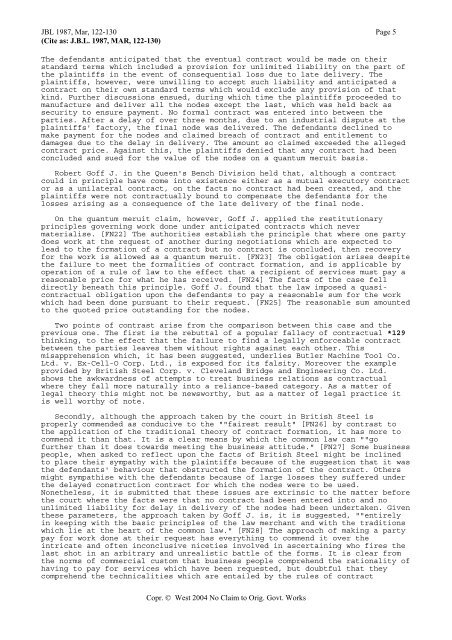Tesco v Constain - Thomson Reuters
Tesco v Constain - Thomson Reuters
Tesco v Constain - Thomson Reuters
Create successful ePaper yourself
Turn your PDF publications into a flip-book with our unique Google optimized e-Paper software.
JBL 1987, Mar, 122-130 Page 5(Cite as: J.B.L. 1987, MAR, 122-130)The defendants anticipated that the eventual contract would be made on theirstandard terms which included a provision for unlimited liability on the part ofthe plaintiffs in the event of consequential loss due to late delivery. Theplaintiffs, however, were unwilling to accept such liability and anticipated acontract on their own standard terms which would exclude any provision of thatkind. Further discussions ensued, during which time the plaintiffs proceeded tomanufacture and deliver all the nodes except the last, which was held back assecurity to ensure payment. No formal contract was entered into between theparties. After a delay of over three months, due to an industrial dispute at theplaintiffs' factory, the final node was delivered. The defendants declined tomake payment for the nodes and claimed breach of contract and entitlement todamages due to the delay in delivery. The amount so claimed exceeded the allegedcontract price. Against this, the plaintiffs denied that any contract had beenconcluded and sued for the value of the nodes on a quantum meruit basis.Robert Goff J. in the Queen's Bench Division held that, although a contractcould in principle have come into existence either as a mutual executory contractor as a unilateral contract, on the facts no contract had been created, and theplaintiffs were not contractually bound to compensate the defendants for thelosses arising as a consequence of the late delivery of the final node.On the quantum meruit claim, however, Goff J. applied the restitutionaryprinciples governing work done under anticipated contracts which nevermaterialise. [FN22] The authorities establish the principle that where one partydoes work at the request of another during negotiations which are expected tolead to the formation of a contract but no contract is concluded, then recoveryfor the work is allowed as a quantum meruit. [FN23] The obligation arises despitethe failure to meet the formalities of contract formation, and is applicable byoperation of a rule of law to the effect that a recipient of services must pay areasonable price for what he has received. [FN24] The facts of the case felldirectly beneath this principle. Goff J. found that the law imposed a quasicontractualobligation upon the defendants to pay a reasonable sum for the workwhich had been done pursuant to their request. [FN25] The reasonable sum amountedto the quoted price outstanding for the nodes.Two points of contrast arise from the comparison between this case and theprevious one. The first is the rebuttal of a popular fallacy of contractual *129thinking, to the effect that the failure to find a legally enforceable contractbetween the parties leaves them without rights against each other. Thismisapprehension which, it has been suggested, underlies Butler Machine Tool Co.Ltd. v. Ex-Cell-O Corp. Ltd., is exposed for its falsity. Moreover the exampleprovided by British Steel Corp. v. Cleveland Bridge and Engineering Co. Ltd.shows the awkwardness of attempts to treat business relations as contractualwhere they fall more naturally into a reliance-based category. As a matter oflegal theory this might not be newsworthy, but as a matter of legal practice itis well worthy of note.Secondly, although the approach taken by the court in British Steel isproperly commended as conducive to the ""fairest result" [FN26] by contrast tothe application of the traditional theory of contract formation, it has more tocommend it than that. It is a clear means by which the common law can ""gofurther than it does towards meeting the business attitude." [FN27] Some businesspeople, when asked to reflect upon the facts of British Steel might be inclinedto place their sympathy with the plaintiffs because of the suggestion that it wasthe defendants' behaviour that obstructed the formation of the contract. Othersmight sympathise with the defendants because of large losses they suffered underthe delayed construction contract for which the nodes were to be used.Nonetheless, it is submitted that these issues are extrinsic to the matter beforethe court where the facts were that no contract had been entered into and nounlimited liability for delay in delivery of the nodes had been undertaken. Giventhese parameters, the approach taken by Goff J. is, it is suggested, ""entirelyin keeping with the basic principles of the law merchant and with the traditionswhich lie at the heart of the common law." [FN28] The approach of making a partypay for work done at their request has everything to commend it over theintricate and often inconclusive niceties involved in ascertaining who fires thelast shot in an arbitrary and unrealistic battle of the forms. It is clear fromthe norms of commercial custom that business people comprehend the rationality ofhaving to pay for services which have been requested, but doubtful that theycomprehend the technicalities which are entailed by the rules of contractCopr. © West 2004 No Claim to Orig. Govt. Works
















